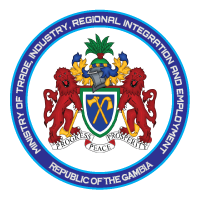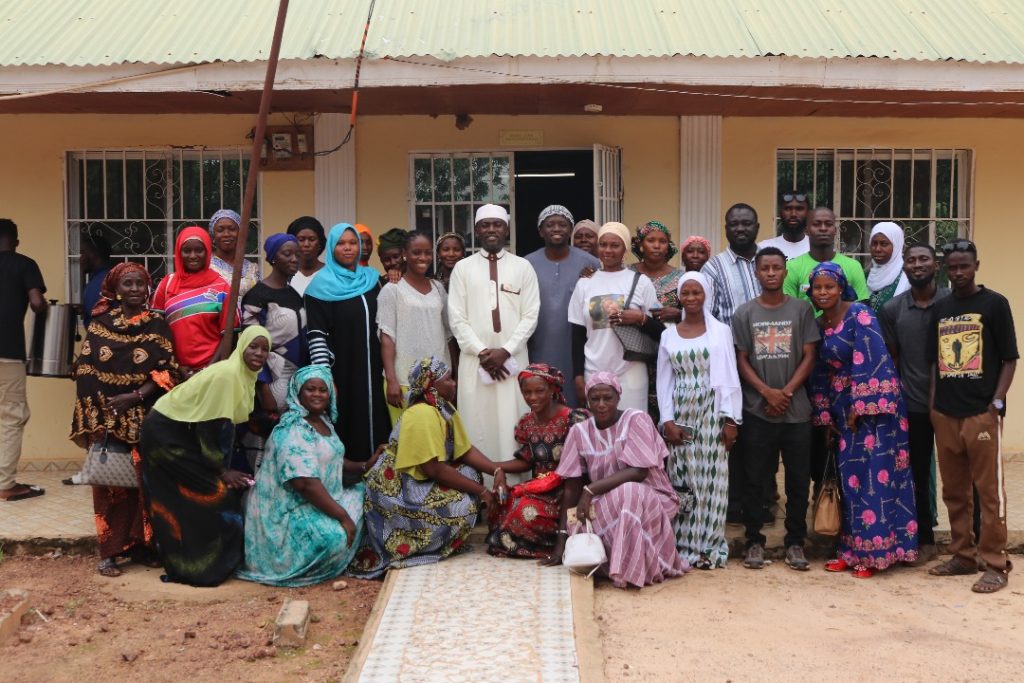The Ministry of Trade, Industry, Regional Integration and Employment (MoTIE), in collaboration with development partners, successfully hosted a Regional Stakeholders Sensitization Workshop on the National Strategy on Leveraging FinTech to Drive Financial Inclusion for Women Cross-Border Traders in North Bank Region (NBR) on July 23rd, 2025, and in Lower River Region (LRR) on July 24th, 2025.
Remarks
Mr. Solo Gheran Sanyang, Principal ICT Officer at MoTIE, delivered the opening statement on behalf of the Ministry. He emphasized that the FinTech Strategy was as result of extensive research and has now evolved into a full-fledged national framework aimed at empowering women cross-border traders.
He noted that despite their central role in the Senegambia Corridor’s informal economy, women traders often face limited access to finance, digital tools, and inclusive financial services. The strategy aims to address these challenges by promoting secure and accessible digital financial platforms.
Mr. Sanyang outlined three objectives of the workshop.
- To introduce the strategy’s vision and key pillars.
- To raise awareness of how FinTech can support cross-border trade.
- To encourage collaboration between public and private sector actors.
He concluded with gratitude to partners such as the European Union (EU), Investment Climate Reform (ICR), and Wave Gambia, highlighting their technical contributions to developing the strategy.
Opening Remarks from Regional Governors NBR.
Hon. Lamin Saidykhan, Governor of the North Bank Region (NBR), officially opened the workshop in NBR on July 23, 2025. He applauded the Ministry for bringing such critical discussions closer to the communities, especially at a time when digital financial inclusion can significantly uplift women traders.
He described FinTech as more than just a tool, it is a lifeline. With digital wallets, mobile payments, and microloans, women traders can now save securely, access loans, and expand their businesses.
Governor Saidykhan emphasized that no woman should be left behind in The Gambia’s journey toward a digital economy. He declared his personal commitment to supporting the strategy and urged all stakeholders to work together for inclusive regional development.
Opening Remarks from Regional Governors LRR.
Hon. Seedy Lamin Bah, Governor of the Lower River Region (LRR), welcomed participants and officially opened the LRR workshop on July 24, 2025. He emphasized LRR’s geographic and economic importance as a trade hub bordering Senegal. He stressed the importance of community level sensitization, especially for women with limited financial literacy.
He encouraged participants to fully participate in the workshop, ask questions, and take advantage of the resources available. Governor Bah praised the Ministry and partners for their inclusive approach and declared the workshop officially open.
Presentations were delivered by various experts on diverse topics
Mrs. Aminata Debbasey, Senior Economist, led a session on Empowering Women Through Digital Financial Literacy. She outlined how tools like mobile money apps, QR code payments, and WhatsApp Business can help women track expenses, access loans, and manage their finances securely.
She stressed that women do not need to be tech experts to control their finances, it just requires the right tools and guidance. She also highlighted safety tips for digital users, warning against sharing passwords and urging the use of secure internet connections.
“When women control money, they control their future,” she concluded.
Mr. Solo Gheran Sanyang, Principal ICT Officer, presented on Identifying Digital Risks and Practicing Safe Online Behaviors. He explained the types of hackers and online scams and emphasized the importance of digital safety for traders.
He advised participants to be cautious with the information below.
“Do not use your date of birth, your name, or your family members’ names as a password. Instead, use a strong password that includes uppercase letters and symbols.”
He also encouraged the use of secure connections and two-factor authentication, stressing the importance of being cautious about what is shared online.
Mr. Ismaila Saidy, Senior Economist, gave a comprehensive overview of Legal Rights under ECOWAS and AfCFTA Trade Protocols. He explained that these frameworks guarantee free movement of goods, people, and services and offer mechanisms for reporting non-tariff barriers and resolving disputes.
For Gambian women cross-border traders, these rights translate into.
- Easier access to formal trade systems.
- Lower border clearance costs.
- More opportunities for business expansion.
Mr. Saidy encouraged traders to ensure proper documentation, attend training programs, and engage with trade associations for better representation and access to support.
Conclusion
The workshops held in NBR on July 23 and LRR on July 24, 2025, successfully laid the groundwork for implementing the National FinTech Strategy at the regional level. With strong support from local authorities, development partners, and MoTIE, the initiative is poised to make a tangible impact on women’s economic empowerment and cross-border trade in The Gambia.
This effort underscores a national commitment to building a digitally inclusive and financially empowered future leaving no woman behind.

